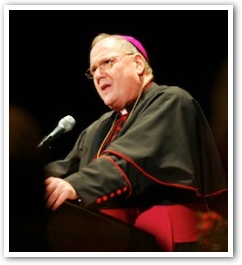Cardinal Dolan: That 'Conscience Thing' Is 'Ennobling,' 'Enlightened'
- KATHRYN JEAN LOPEZ
"Government has no business interfering in the internal life of the soul, conscience, or church," Timothy Cardinal Dolan said Monday night at the Newseum in Washington, D.C.
 |
In an event on religious liberty in America sponsored by the John Carroll Society, Cardinal Dolan sought to "restore the luster" on our "first and most cherished freedom."
"The threats to [that] freedom are abundant," he said. He focused on two timely ones: First, a secularist drive that "will tolerate religion as long as it's just considered some eccentric private hobby for superstitious, unenlightened folks, limited to an hour on the Sabbath, with no claim to any voice in the public square." This "is hardly 'free exercise,'" he countered, and quoted the first lady speaking at the African Methodist Episcopal Church Conference, where she seemed to understand this: "Our faith just isn't about showing up on Sunday . . . it's about what we do on Monday through Saturday."
And then "America's shepherd," as Speaker of the House John Boehner introduced him for the final prayer at the Republican convention in Tampa, highlighted the HHS contraception, sterilization, and abortion-inducing-drug mandate that currently has his New York archdiocese suing the federal government, calling it "a direct intrusion of the government into the very definition of a church's minister, ministries, message, and meaning." The HHS mandate controversy, he repeated, is about "the raw presumption of a bureau of the federal government to define a church's minister, ministry, message, and meaning."
"The defense of religious freedom is not some Evangelical Christian polemic, or wily strategy of discredited Catholic bishops," the president of the U.S. Conference of Catholic Bishops said, countering the media narrative, "but the quintessential American cause, the first line in the defense of and protection of human rights."
"Freedom of religion," he said, "has been the driving force of almost every enlightened, unshackling, noble cause in American history," the cause of some of our most "liberating, ennobling" movements, including the civil-rights movement, he said. In defending religious liberty today, he said, we are "protecting America. We act not as sectarians, but as responsible citizens. We act on behalf of the truth about the human person."
And just as he had a prayerful answer last week to a Democratic convention where Catholicism was used as a cover for an extremist culture-of-death platform, he had a response to a former House speaker's attempt to dismiss religious-liberty concerns: "Recently, sadly, a prominent Catholic political leader down the street stated that 'the Church needs to get over their conscience thing.'"
"The defense of religious freedom is not some Evangelical Christian polemic, or wily strategy of discredited Catholic bishops," the president of the U.S. Conference of Catholic Bishops said, countering the media narrative, "but the quintessential American cause, the first line in the defense of and protection of human rights." |
"No, we don't; no, we can't;" Dolan responded, "as believers, as Americans," though the applause all but drowned out the "as believers, as Americans" line.
Cardinal Dolan the historian showed up at the podium Monday night, his doctorate in American Catholic history on display as he walked through some of the religious leaders of our past who secured our freedoms. "Without the unfettered preaching of the Gospel, without the leadership of Black southern preachers, led heroically by the Reverend Martin Luther King . . . the civil-rights movement would never have flourished," he said. The cardinal pointed to King's "brilliant" Letter from Birmingham Jail as "perhaps one of the most cogent proof texts for religious freedom, the primacy of conscience, the proper posture of religion in the national conversation, and the normative role of natural law in our nation's founding."
He looked next door to Maryland as a "laboratory" of religious freedom, where colonists "were shrewd," Cardinal Dolan said:
They did not want any favored status for either their beloved Catholic faith or any other religion. Nor did they want their faith, however normative in their own life, to have any institutional input in the colonial government. Mainly, they just wanted to be left alone! Left alone . . . to practice their faith, and follow their properly formed consciences in the public square.
"Leave religion alone [is] the guiding principle of religious freedom," he underscored. In a brief Q&A, he emphasized that our failure to protect religious freedom puts all our other "cherished liberties" in danger. "We don't want to curse the freedom bell as a sham; we want to let freedom ring!" he implored.
His full remarks, as prepared, can be read here.
 This is Meaghen Gonzalez, Editor of CERC. I hope you appreciated this piece. We curate these articles especially for believers like you.
This is Meaghen Gonzalez, Editor of CERC. I hope you appreciated this piece. We curate these articles especially for believers like you.
Please show your appreciation by making a $3 donation. CERC is entirely reader supported.

Acknowledgement
Kathryn Jean Lopez. "Cardinal Dolan: That 'Conscience Thing' Is 'Ennobling,' 'Enlightened'." National Review Online (September 11, 2012).
Reprinted with permission of National Review Online. The original article on NRO is here.
To subscribe to National Review Digital go here. To subscribe to National Review print edition go here.
The Author
 Kathryn Jean Lopez is a senior fellow at the National Review Institute, editor-at-large of National Review Online and founding director of Catholic Voices USA. She is an award-winning opinion journalist and a nationally syndicated columnist with United Media's Newspaper Enterprise Association.
Kathryn Jean Lopez is a senior fellow at the National Review Institute, editor-at-large of National Review Online and founding director of Catholic Voices USA. She is an award-winning opinion journalist and a nationally syndicated columnist with United Media's Newspaper Enterprise Association.


